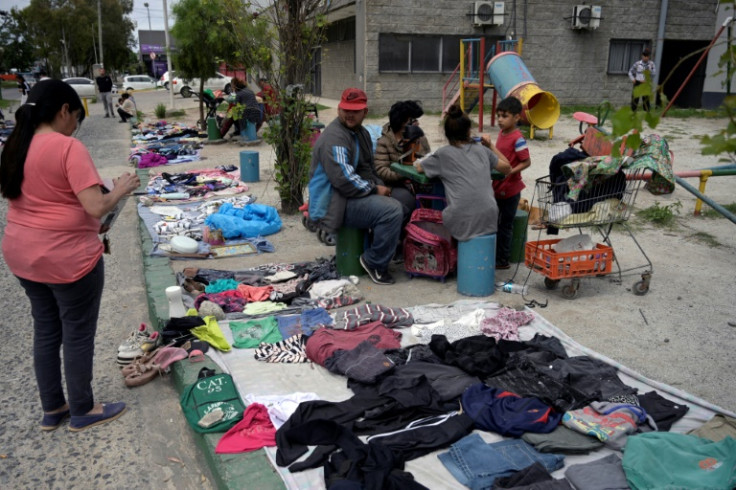
At her small clinic in Buenos Aires, veterinarian Diana Del Rio, 62, is anguished over her decision to cast a blank vote in Sunday's presidential election, but she sees no other option.
"It breaks my heart because it doesn't seem right to me, but I am going to vote blank because I don't like either candidate," she told AFP.
"One seems to me to be a disrespectful madman, and the other... we have seen his actions for many years."
Gripped by its worst economic crisis in decades, Argentina is facing an unusual choice in Sunday's election: elect Economy Minister Sergio Massa, who has overseen triple-digit inflation and rising poverty, or choose libertarian outsider Javier Milei who wants to ditch both the central bank and the national currency -- using the US dollar instead.
"For many this is an impossible choice. By far the most decisive voters right now are this huge block of Argentines who strongly dislike both choices," said Benjamin Gedan, director of the Argentina Project at the Washington-based Wilson Center.
Polls have the two candidates neck-and-neck, with Milei slightly ahead, meaning last-minute decisions will be crucial.
"I am going to make the decision at the final moment, after having done all my calculations," said Ernesto Velasquez, 41, walking in a park with his toddler.
The IT worker described the situation as a "technical tie. The country is divided in half."
According to an average of opinion polls, between seven and 13 percent of voters are undecided or planning a blank ballot.
The most common refrain from the undecided, is that they will end up choosing the best of two bad options.
"You vote looking for the lesser evil. You vote, but you don't vote," said another vet at the animal clinic, Julieta Diaz, 37, who said she could not decide what to do.
Maria Lopez, 39, an employee at a trendy jewelry store, said she felt "bewildered," but really didn't want to cast a blank ballot.
"Oh well, these are the options we have," she said.
She and her husband have stalled their plan to try for a baby in the current economy, where annual inflation stands at 143 percent.
"You can't plan the future, whether it's children or projects. You don't know what's going to happen tomorrow. Rent went through the roof. It gets harder and harder to make it to the end of the month."
Like many, she is anxious about the prospect of a devaluation of the strictly controlled peso, which analysts say is inevitable after the vote.
Not far away, Juan Cruz Kosiak, 23, is handing out flyers for a popular internet service provider. He is working in the black and earned only 85,000 pesos ($252 on the official rate) last month.
"It's November and you can't plan beyond Christmas. I don't know if in 10 days they will increase my rent, my salary (to keep up with inflation), or fire me because I don't have a contract."
He has completely lost faith in the election candidates.
"I don't see either of them as feasible. I'm not going to show up to vote, because neither represents me."
Some unhappily said they would probably choose Milei, a self-described "anarcho-capitalist" who has sought to tone down his fiery image to appeal to more moderate voters.
"Unfortunately, one has to choose one of the two," said Pablo Rivera, 55, who has run a small florist stand in the upmarket suburb of Recoleta for more than three decades.
He said many clients had stopped coming by, dropping little luxuries such as a fresh vase of flowers.
"If I vote, I will vote for Milei, but I don't want to vote for him either," he said. "This country is a shame. We are a pitiful disgrace."
However, Margarita Perez, 69, in the poor neighborhood on the outskirts of the capital, who cannot afford to retire, said she was "leaning towards Massa."
"I know I am going to vote on Sunday, but I don't know for whom. Milei scares me, I don't know if he is intelligent or crazy."
© 2025 Latin Times. All rights reserved. Do not reproduce without permission.




